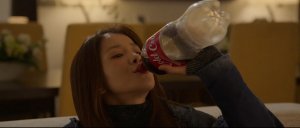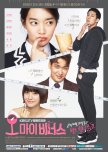
This review may contain spoilers
The road to self-esteem is full of dimples
After watching four depressing dramas in a row, I definitely needed something silly and with a happy ending. Most of all I needed something horny.Someone suggested OMV saying it was full of skinship yet a bit problematic and, in the end, Shin Min Ah convinced me.
Oh My Venus! is indeed horny and silly but I didn't find it as problematic as it may seem at a first glance.
Yes, there are fat suits (Shin Min Ah is adorable even without dimples) and the discourse around body image, just like the whole "you can if you believe it" message are a bit too simplistic.
However, I feel like the underlying moral of the story is an uplifting one, nonetheless.
Shin Min Ah is Kang Joo-eun, this woman who was once Daegu's Venus and, for a number of reasons we just get a glimpse of (like the death of her father and a difficult workplace), has gained a bunch of weight and lost a bunch of self-esteem.
Her boyfriend of 15 years breaks up with her on their anniversary and she finds out he is dating her former friend. Said former friend was once very fat and is now very slim and, also, her new boss (and a bit of a bitch).
Joo-eun is, understandably, distressed by her life.
But fate rescues her in the form of an extremely fit and sexy man that soon becomes her personal trainer.
There is one exchange in these first episodes that convinced me this wasn't a chauvinistic male power-trip about saving women by making them hotter and thinner and it occurs when Joo-eun is venting to her friend about her former friend/boss and she says "I should've said that I was happy to see her. It's something I should've said, and it's not hard to say, why didn't I think to say that until now? Even if I couldn't tell her that she looks great and that she got prettier I should've at least told her that I was happy to see her. She is a friend I haven't seen in a long time. She underwent a total transformation and I turned into this. We could have laughed together about it. Why am I becoming meaner and meaner?".
She is acknowledging that her weight is not the root of the problem. She is so unsatisfied with her life to the point she has become bitter. And she doesn't want to be bitter, nor envious.
She wants to be able to laugh about her misfortunes with the friend she missed.
Joo-eun wants to regain control of her life, of the person she is and she wants to like herself again.
In a way, her body is the easiest starting point for this journey of self-rediscovery.
The aim of Joo-eun's transformation is becoming healthier, rather than looking as thin as she was at 15, and her personal trainer soon becomes the person she trusts her life with and to whom she will show the things she is ashamed of. He comes to know her at her lowest, at her worst and falls in love with her regardless of it.
While he takes care of her body (the whole concept of "your body is mine" is more cringe than cute for me, but I'm starting to think it is a trope in k-dramas), Joon eun will take care of his mind and show him the sweetness of life (mainly in the form of sugary food and lazy days he never allowed himself before).
They heal each other… except for when he refuses to see her for the whole year it takes to recover from a terrible car accident (she accepted his help at her most vulnerable and he can't accept to be seen at his weakest! … The mother-in-law tries to reason with him on this point in the last episode, though).
The main couple has outstanding chemistry and cute kisses and horny moments and, most definitely, carries the whole show. The other characters are not really developed but I liked the attempt at making a parallelism between Joo-eun and Soo-jin, whom still doesn't like herself despite having lost weight (this is to reinforce the message that the weight itself is not the reason behind unhappiness). I also liked that they apologize and make up.
The ex-boyfriend also proves not to be a total asshole. Another aspect I appreciated, in fact, is the lack of truly evil characters. We get only one scheming uncle whose every attempt at harming the male lead proves ridiculous.
On the other hand, there is no angst whatsoever and that is mainly because there isn't much of a plot to begin with.
The little bit of plot we get is absolutely ridiculous. For example, the scandal about (!?!) John Kim's double life as chaebol and fitness trainer, which becomes the reason he starts training Joo-eun, doesn't seem scandalous enough to ruin a CEO (I've come to learn that Koreans are easily shocked, though, especially if t comes to celebrities dating), nor it seems plausible that the slightly-evil uncle decides to embark in a kamikaze mission in order to provoke a car accident and kill said CEO.
In short, the plot is risible and, consequently, the pacing is uneven throughout the 16 episodes. The story could have done with half of them, really.
I like the ending. It felt realistic as the journey toward self-love is never-ending and there are ups and downs along the way. Also, pregnancy wreaks havoc on a woman's body. But Joo-eun looks happy in the end, even without her dimples.
Female Empowerment Score 5/5
Was this review helpful to you?

How much amnesia is too much amnesia?
Although the story is as insipid as one might expect from a soap opera, with its open narrative and outrageous plot twists (and blatant overuse of amnesia tropes), the cast made it enjoyable enough to hang on to the last episode (with the exception of Dan-dan's father, whom I couldn't stand).The kids were the most adorable ensemble ever. Seo Woo-jin is a natural born actor. I swear it is scary how good he is at emoting: whenever he cried on screen, I cried too. The other two child actors were very natural as well. Choi Myung-bin is somewhat of a well-known veteran among acting children (I think I've seen her at least in a dozen different dramas) and she is an undisputed talent, whereas the other kid, Yoo Joon-seo, is less experienced yet he is on par with his colleagues and also absolutely cute.
The female cast consists of some of my favorite actresses: Kim Young-ok, as the national grandma; Cha Hwa-hun, as the greedy, scheming ajhumma (hilarious!); Lee Il-hwa, as the prodigal mother; and, finally, Park Ha-na, as the evil, crazy girlfriend. Their performances are delightful and they really tried to sell their characters with the utmost professionality but the writing was just too awful to be redeemed by their talent. Also, my feminist self left my body whenever I was watching an episode in order to avoid being shamed into oblivion.
The male characters are ridiculous, at best. Just like the plot. Personally, I endured it just to ogle at Ji Hyun-woo in suits (and out of them too...).
The main couple has a decent amount of chemistry, but their love story is problematic (and not because of the age difference).
All in all I would not recommend this to anyone I know, mainly because I wouldn't want them to realize I watch this kind of nonsense.
However, I must admit it is entertaining to watch just to discover what ludicrous extremes the writers' fantasy is going to reach.
Female Empowerment Score 2/5.
Was this review helpful to you?

This review may contain spoilers
That time the Hong sisters abused Gong yoo
Surprisingly, I didn't watch this drama because of Gong Yoo.However, after having endured all 16 episodes, I must admit he should be the sole reason for watching it.
If you're intrigued by the synopsis or have faith in the Hong sisters, you are warned that you will soon loose both interest and faith (and of course precious time you could spend binge watching something better).
Personally, I chose this drama because I was craving a tropey rom-com and, after having enjoyed Alchemy of Souls and its perfect use of countless tropes, I felt assured in putting all my trust in the hands of such experienced storytellers.
But, clearly, the Hong sisters must have been drunk when they wrote this one.
The story starts big (haha!) with a clumsy female protagonist who is incredibly lucky in her misadventures and manages to catch the eye of a handsome and cool doctor (Gong Yoo) whom she ends up engaged to and is going to marry soon.
But something is amiss: is he cheating on her?
At the same time she has just begun working as a teacher in a private high school and gained this handsome and cute little admirer who shamelessly courts her: scandalous!
A fatal car accident will upend the lives of these people in unimaginable ways.
Amazingly, all of this is packed into episode 1!
I must admit that I was genuinely excited after watching it: we get the juicy bit, with the affair, and also the forbidden bit, with the teenager that has the hots for his teacher, and an interesting mix of daring moral quandaries to be explored. Yet, just as we delve deeper into the story, things, and characters, become suddenly shallow and generally nonsensical.
At a certain point, halfway through the series, I was done with every single character but still curious on how the writers were going to solve the horrible mess they made and just fast forwarded to the end (yes, even through Gong Yoo's scenes... what a shame!) to the final let down.
Ultimately, there is absolutely nothing I deem savable in this drama. I'll give it a 4 (because it would be otherwise shameful for my beloved Gong Yoo who gave his best anyway) and take it as a sort of unfinished (half-assed) experimentation on themes that will be later explored in more successful Hong sisters' works (namely the soul-swap concept and the pupil/teacher love relationship).
Female Empowerment Score 0/5 the lowest score ever! The female lead becomes so frustratingly annoying that it is painful to watch. Female writers, as capable as these ones, coming up with these insufferable female characters are the worst kind of misogyny.
Was this review helpful to you?
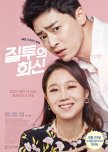
This review may contain spoilers
Weather forecast: love triangles with a chance of loose ends
Although 24 episodes may seem like a chore, this drama manages to make all of them worthwhile.I risked dropping it after the first episode, though, when not just one but three love triangles became apparent from the get go. I put my trust in the very strong cast and was not disappointed. In fact, this rom-com has unexpected depths that make it interesting for the reluctantly romantic too . Despite starting with a cancer diagnosis and character death, the tone is always light and even the more dramatic scenes cleverly keep an undercurrent sense of humor that is aided by the excellent comedic skills of the actors.
Of course, we get our romantic tropes, yet the author has the ability to steer away from clichés and keep the narrative fresh and gripping.
In the first half of the show we are exposed to an ambitious number of themes, situations and characters, a bunch of them will not survive to the end (Wok of Love, by the same writer, is similar in this aspect. The loose ends might be a sort of irritating stylistic choice...)whereas those that progress toward their resolution are consistent enough to grant general coherence and, most of all, viewer's satisfaction.
The main characters are well written and come to life in the expert hands of Gong Yo Jin and Jo Jung Suk. I won't speak about chemistry because it would be like minimizing their acting skills since I am a firm believer in the fact that great actors can conjure passion with a rock if they need to. So, I'm going to say that, whether they're bickering (like an old married couple) or kissing, they are fire. Very hot.
Go Kyung Pyo is up to the standard (and up there in my personal Korean Hotties' Olympus), of course, but his character is doomed to a blander taste. Nonetheless, this is one of those rare dramas where the second male lead gets a decent exposition and at a certain point I wasn't so sure about the outcome of the triangle (honestly, if I were Na Ri, I would've picked him. He was sweet, well mannered, dependable, had a beautiful house, knew how to make marvelous dresses to compliment her figure and all this in addition to being HOT and RICH. He was even capable of respectfully battling his mother!).
I am not too fond of the triangle resolution. I mean, I don't believe that one can discern love based on the presence or lack of jealousy.
In my experience, jealousy stems from insecurity. I read Na Ri's jealousy as the result of intermittent and deficient emotional availability on Hwa Shin's part. He is sweltering hot but also inherently problematic.
The sad truth is that the majority of us can't help but fall for self-assured (and self-centered), competent (know-it-all), determined (bull-headed), manly assholes.
Hwa Shin makes great use of grammar and communication skills when reporting news but is ridiculously unable to express his innermost feelings and thoughts. Therefore he gets jealous, he pushes and pulls his beloved in a power game fit for kindergarteners, all in the attempt to keep her love. A love he didn't know how to respond to in the beginning and that became precious to him only when threatened.
On the other hand, we have Na Ri, a character that could have easily become a candy girl (for which the very basic requirements are : being1) hardworking, 2) cheerful, 3) innocent and 4)catching the eye of a wealthy chaebol), but manages, in her utter inexperience, to express her love fearlessly (despite the mocking and the indifference), honestly deal with her vulnerability, grow beyond it, save her beloved, teach him, make him human.
In short, an everyday woman.
I love the creative solution she comes up with to test her suitors by living together (I would have continued living with both and being pampered indefinitely). Her only true shortcoming is having a crush on someone as difficult as Hwa Shin.
The bromance was very strong in the beginning, but lost consistency along the way. I would've liked a little more backstory. The glimpse we get on the shared girlfriend doesn't shed any light on the bromance origins. It does, however, cast a doubt on the sincerity of Hwa Shin and Jeong Won's feelings toward Na Ri: are they in love or just competing?
I approved of them resolving their issues and going back to being friends, albeit I'm not really sure on the dynamics of the reconciliation (apparently, it is proper etiquette in Kdramas for the losing suitor to graciously admit defeat and stay friends with the main couple).
I deeply appreciated the idea of talking about breast cancer as a male experience. It gave the story a unique spin and is effective in underlining the social stigma and isolation of cancer patients.
I was sold on the scene in which Hwa Shin undergoes mammography. It is something the audience had to experience through his eyes. Also, the dialogues that refer to the surgeries, both Hwa Shin's an Na Ri's, where they express their concerns on the aesthetic outcome and the lopsided chest, definitely won me over.
I would've liked a stronger focus on the life of a Korean newsroom (I am a fan of The Newsroom with Jeff Daniels), although the little glimpses we get are enough to enrich the story as well as convey a little bit of the author commentary on social issues.
As for the things I didn't like instead, first and foremost the loose ends and the almost complete eclipse of the side characters storylines. Na Ri, for example, is, in the beginning, an affectionate sister who makes sacrifices in order to provide for her teenage brother. Later on, she will practically abandon him to his own devices for the majority of the series (she even misses the career counseling meeting!). And what about Chef's asexuality, a brilliant prompt that is rashly and uninspiringly resolved in the end (although I liked the ending of the triangle between the 2 moms and Gang Pal). There are many other subplots that frame the main narrative that are carelessly managed and just disturb my OCD. I won't put them here now but I'll keep them listed in my heart. For sure.
Female Empowerment Score 4/5 Na Ri is a resilient woman with a dream. She reports the weather and is held in contempt for trying to meet the chauvinistic requests of her employer. She dreams of being dignified and recognized for the effort she puts in gaining competence. But her workplace is a rat-race of women trying to win in a rigged game (it is clear how different the work experience is for Na Ri and Hwa Shin). Despite it all, these amazing women (Seong Sook, Ja Yeong, Hye Won) will learn to support each other. Also, Na Ri is very independent, she knows when to accept other people help but is resourceful and has the capacity to defend herself (from sleazy Anchor Park) and overcome any hardship . She could very well go on living on her own and be successful, however she chooses to adopt this complete mess of a man that would have definitely perished without her. She loses one point though for choosing Hwa Shin in place of Jeong Won...
Was this review helpful to you?

This review may contain spoilers
the wigs are better than the narrative structure
On paper, this movie had the potential of becoming the redeeming title in my ever-growing list of otherwise-questionable, hormone-driven viewings.On paper, a period piece with a bombastic cast of widely acclaimed actors such as Jeon Do-yeon, Lee Byung-hun, Lee Kyung-young and, even, Kim Go-eun (and, foremost, my beloved Junho who constantly inspires my watchlist) should have been a failproof winner, right?
Spoiler: it was not.
Now, I can tell that this movie was expensive, not only because of the amazing cast, but also for the undeniable high quality of the production. In fact, cinematography is strong, set design is stunning, fighting scenes are a beauty and even wigs are on point! (in my opinion the least embarrassing Goryeo era wigs seen up until now). The story might not be everyone's cup of tea (with the parricide and matricide and twisted vengeance plot) yet it has all the necessary cruelty and perversion required for epic storytelling both in the western and eastern tradition.
All these superb ingredients are bound to make something memorably tasty and, instead, all we get is the blandest of salads.
What a shame.
It is my humble and unrequired opinion that the reason for such a bafflling nonsuccess is to be found in the narrative structure (or rather in the lack of it). The exposition is very minimal, almost non-existent, and confusing. The relationships between the characters evolve abruptly, with no natural progression and at times I wondered if I was missing scenes. As a result I was totally incapable of establishing any kind of bond with the characters despite actively trying to (I really wanted to sympathize with shirtless Junho).
Someone argued that the movie is too short (with its very average length of 120 minutes) to set the story properly and I had the horrifying thought that binge-watching an unspeakable number of 16 episode-long kdramas must have been damaging to the point I am now unable to enjoy a normal sized movie. So I tried watching 3 more movies after this one and it turns out I'm not broken. I liked all three of them just fine despite the fact that their stories were possibly even crueler.
Therefore, in the end, I stand un-redeemed by Memories of the Sword and I am also a bit annoyed for the fact that it wasted (Lee Junho!) so much potential.
Female Empowerment Score 2/5 I felt like they were implicitly saying that men are driven by reason and ambition, whilst women are driven by their emotions and are terminally twisted.
Was this review helpful to you?

This review may contain spoilers
The camellia blooms from late December through March
A well written, well executed drama that is both a romantic comedy and a thriller.The cast is amazing and it's a perfect watch for k-drama neophytes (despite the 20 episodes) and families.
The male protagonist is interpreted by Kang Ha-neul, whom I've met in Scarlet Heart Ryeo. Back then I fell for his coward, mediocre bad prince with outrageous hair, how could I possibly resist the sweet and loyal goofball that is Yong-sik?
I couldn't.
He is so very precious that it is clear he was written by a woman.
Mind you that I also developed a soft spot for Jong-Ryul, but he is a bit problematic so I'll just lust after him without giving him all my heart.
The female lead is played by Gong Hyo-jin, a new entry for me (but I plan on watching Master's Sun soon) and in my opinion a terrific choice. She managed a surprising balance between fragile and strong and, moreover, between pitiful and endearing. There are good dramas where the unlucky backstory of the protagonist is so heavy handed in its tragedy that it feels absurdly comic to me.
Now, Dong-baek is one of those incredibly unlucky characters, yet her lighthearted kindness and her honest smile make her real. She is not bravely enduring her catastrophic fate with the tenacity of a superwoman, but rather she is trying her best while being scared, insecure, regretful and lost.
There are the glorious moments when she stands up for herself and finds her inner strength and there are the moments when she is meek and timid and this duality brings her character to life.
Go Doo-shim and Lee Jung-eun are the epic grandmas we needed. Honorable mention for Jeon Bae-soo, Kim Sun-young, Yeom hye-ran and even Jang Hye-jin (in a cameo). All my favorites in one place!
The plot is engaging and well paced, easy to follow.
Maternal love and life in a small community are the main themes, but the writer (Im Sang-choon) also includes a commentary on social stigmas (Moms can't be single nor open a bar in Korea, apparently), mental health and the hardships of finding one's self-worth and social identity.
Our relationships and the people surrounding us shape our view of the world and can make a heaven out of hell or vice versa. As our experiences mold our identity, we are also capable of making a conscious choice on how to react to uncontrollable events. Hyang-mi and Jessica are a sort of Dong-baek alter ego in that sense. They all cope with their childhood trauma in different ways.
I liked the speech about miracles and the one about happiness.
Everyone gets their closure in the end.
I laughed and also cried a little and it felt good.
It felt organic.
Female Empowerment Score 5/5: from the kickass grandmas, to the feisty neighborhood gang of ajhummas, no female in this drama is on the sideline. Wheter they decide to drag each other down, or build each other up, these women are the main characters in their story.
Was this review helpful to you?
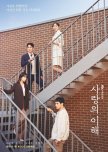
This review may contain spoilers
Do introverts mate? Not in this drama
This is another one of my hormone-driven viewings (I am seldom proud of them) I convinced myself to undertake with the sole purpose of reliving the strong feelings Yoo Yeon-seok elicited in me during Mr. Sunshine. I was hoping for a modern Dong-mae and, predictably, was disappointed.Sadly, no character in this drama is supposed to be charming. Also, do not be deceived by the word "love" in the title. It may lead you to believe this drama is about the birth of a love story when in fact it is about an aborted one.
We have two introverts that start liking each other and, as tortuous and difficult as their path toward a relationship is, it's not interesting enough to fill 16 episodes.
All the things that are said about introverts and their problematic approach to reality are true, though.
To the unsuspecting eye of an extrovert, the behavior of the characters, the female lead in particular, may seem senseless if not cruel. However, an experienced introvert, like myself, knows that 99% of her choices derive from the fact that she wants but can't let the world see that she does because she thinks she's not allowed to want. So she tries to be content and devotes herself to the next best thing and all her actions hinge on the subsequent guilt and bullheadedness that chains her to her choices. At the same time she is not able to kill the hope of getting what she truly wants and can't lie convincingly.
The male character is just as cowardly and twisted, of course.
Obviously, this is all very toxic for the people involved yet it is not senseless.
These characters' motives are clear to me.
I must be just as damaged as them.
I think this drama gives a realistic, albeit depressing, point of view on adult relationships (romantic relationships as well as workplace relationships). Nonetheless, it gets boring to watch this asinine mating dance of adult insecurities and emotional damage.
I guess the performances are good, yet not outstanding. I am still a fan of Yoo Yeon -seok though.
The ending is as lukewarm as the rest of the series. I don't think there's any true character growth except maybe for Jong-hyun who manages to find his self worth and build on it (and Soo-young is a bit responsible for this growth despite the mess she made of him).
There is no real take home message here save only for the fact that the interest of love might be just as burdensome as the interest on loans. (I wanted to end this with a wise adage or something, but I came up with this cringe motto. I guess it goes well with the realistic and depressing tone of the drama, though)
Female Empowerment Score 3/5 : the women here try to help each other in a difficult, chauvinistic, work environment
Was this review helpful to you?

This review may contain spoilers
Not Ok, Taecyeon!
The overall score in this review is (clearly) heavily influenced by my fangirl heart, beating to the rhythm of 2PM songs.In fact, all I wanted was to listen to Taec's heartbeat! Perhaps even catch a glimpse of him tearing his shirt off as he used to...(that would have been worth at least a full point in the final score)
Indeed, my whole reason for watching this drama was really just to support our beastly idol and I had no expectation whatsoever. On the contrary, more than expectations, I had a bunch of reservations about the vampire theme, one that I explored to exhaustion in my teens and that holds little to no interest for me nowadays. Thus, I ended up putting this drama off for months while waiting to be in the most forgiving and neutral disposition possible and, when I was finally able to start it and watched the first couple of episodes, I found myself positively excited!
The series begins with an upbeat and comedic tone à la "What We Do in the Shadows" that makes for a refreshing opening. I genuinely liked the vampire trio dynamic: they are endearing loosers that struggle to keep up with the times (which I find infinitely relatable now that I am in my thirties...sigh!). Also, their beef with modern capitalism is hilarious and a great variation on the abused immortal-handsome-and-rich formula.
Personally, I think Taecyeon is formidable when interpreting whimsical characters. He has great comedic timing and a natural talent for slapstick with his impressive range of cute/ridiculous facial expressions and overgrown limbs. I enjoy his acting the most when he unleashes his potential for antics (i.e. his crazy villain in Vincenzo is absolutely brilliant). I think he fares particularly well in balancing being extra without being actually over the top. That is what convinced me that the drama had robust enough premises to evolve into something worthwhile.
But mine was, definitely, premature optimism since the series takes a 180° degree turn around episode 6 or so. The tone gets abruptly serious. The story literally flatlines (ahem...) as we suddenly loose all the potentially original plot points in favor of the dullest of fanfictions. Because that is what I was reminded of while watching this drama. Especially during the party episode which employs one of the most popular romance tropes in its cringiest declination and with the most uninspired jealousy scene ever (honestly, I'm usually a sucker for party scenes done well, Pride and Prejudice style).
At that point I kept watching just to finally discover who took the gold.
The storyline has zero depth: everything happens without explanation, with an impressive number of plots non-sequitur, and because Cat-ex-machina said so.
The romance left me completely indifferent and the modicum of sympathy I felt for Woo Hyeol was totally built upon my pre-existing bias regarding Taecyeon. Not even the happy community scene at the end was enough to reanimate my k-dramatic heart.
The open casket funeral was too much...
In conclusion, I wouldn't recommend watching Heartbeat, not even to Hottest, although I made an intriguing discovery that partially redeemed this viewing: Park Kang Hyun. He can act, he can sing and he is cute as hell. Hope to see him in a better drama next.
Female Empowerment Score 2/5: Joo In Hae is written as inconsistently as the rest of the characters. In the beginning she is this tough, combative girl. Her personality traits are clearly the result of trauma (the customary kdrama unlucky orphan backstory) and make her fiercely independent and extremely reserved. She keeps her distance from others but is also ready to fight in order to protect the weakest and heal the wounded as a trained nurse (I liked the school nurse plot). She was preoccupied with mere survival for so long that she forgot how to enjoy life and be carefree with her heart. In the beginning, she is relatable and convincing (I love how Do Shik gets her and tries to help her without her noticing). But then, suddenly, we are told her character experiences growth (e.g. she falls in love, accepts help, makes friends, forgives her father), without actually being shown how or why. And, furthermore, she becomes insufferable (the acting follows the script in its decline). Despite being somewhat empowered by her character arc, she doesn't seem to have gained any real agency.
The writers didn't really care for the other female characters either.
Was this review helpful to you?
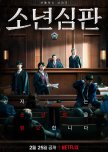
This review may contain spoilers
It takes a village to raise a child
This drama comes at you swinging and knocks you off for good with the last episode.Writing, directing and acting are all superb (and, surprisingly, I found the OST just as outstanding) but I dare say this is not an easy, leisurely watch.
Although the pacing is sustained and the storytelling extremely fluid and engaging (I personally binge watched it in 2 days), the topic is a heavy one. The writer aims at informing a discussion on juvenile justice reform and successfully conveys its complexity while reminding us of its wide impact on society as a whole, not only on the minors directly involved.
We are guided through the main discourse whilst following mainly 3 groups of characters: judges, young perpetrators and victims. The lines among these 3 groups become voluntarily blurred (at one point Judge Sim tells us that anyone can become a victim. Later on, in the episode on judge Kang and his son, we learn that the same is true for perpetrators) and, as we discover each backstory, it is impossible to remain indifferent to the grief onscreen. Nonetheless, it never feels forced or minutely crafted to obtain an easy emotivity.
This was my first encounter with Kim Hye-soo, surprisingly so given her fame and talent, and she instantly became a favorite. Her character is introduced to the audience almost as an antagonist - shrouded in monolithic severity and inflexibility - compared to the warm and sympathetic Cha Tae-joo, who protects and guides the youngsters as their big brother hero.
However, as the story unfolds, we come to respect and appreciate severity as the necessary quality to mete out justice.
A special gravitas, the most inflexible and unwavering constitution is required in seeking the truth in order to uncover guilt and reach the ultimate powerful tool of catharsis: punishment.
Shim Eun-seok transcends her private identity and tragedy to become the personification of a justice that can heal both the victims and the perpetrators.
As doctors save the body, Judges save the ethics that sustains civil society.
And this mission is even more crucial if it involves young offenders at a point in their life when their ethics, their morality, is still indefinite and unshaped.
Kim Hye-soo manages, with her Junoesque physicality, to incarnate the divine quality of justice and shape it as a quintessential mother figure.
Also, she totally feels like a formidable dominatrix (with her high heels and strict suits and natural commanding tone. Tae-joo feels like her devote sub, instead).
Take home message: It really does take a village to raise a child.
Female Empowerment Score 5/5: women are truly the backbone of society
Was this review helpful to you?

This review may contain spoilers
This must have cost a fortune in fake blood!
The main characters were sliced and diced a dozen times each but survived and recovered every seemingly mortal wound until they were finally able to kill them in the last episode (spoiler).One can easily understand, since the very beginning, that this historical drama (set during the years of transition between the Goryeo and Joseon dynasty) is founded on fighting scenes. In fact, they had some legitimately cool shots of angry, pirouetting men with big swords and fancy headbands. Also, there is a strong undercurrent of honorable machismo throughout.
Fighting scenes enthusiasts will surely like this drama.
The first and the second strife of princes are true historical events here narrated with liberties and a very soft political commentary on absolute monarchy and power established on the bloody sacrifice of common people.
All of it is topped with a sprinkle of bromance here and there, a spray of father-son relationship (either problematic or prematurely truncated) and the required damsel in distress (available in a triad of queen, sister and kisaeng madame who once cross-dressed while rebelling against the king).
I hardly cared for any of the characters, so I can say the writing was not my cup of tea, although I greatly appreciated the fanservice in the first episode with the two hunks smiling and bathing together.
I also loved that my boo, Woo Do-hwan (We met for The king: eternal monarch and he really became my sole reason to keep watching that) smiled a lot and had beautiful, shiny, very manly long hair.
The last, but definitely not the least, honorable mention goes to Jang Hyuk who always slays. I love him!
His last scene is the coolest.
Female Empowerment Score 1/5
Was this review helpful to you?
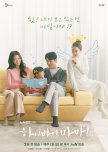
This review may contain spoilers
This drama died with plenty of regrets
This drama definitely had potential (my beloved Lee Kyu-hyung plays the sad dad!) which ended up being squandered in its entirety. And the score I gave is reflective of the enormous disappointment I suffered.I can be petty like that.
Also, I would not recommend this drama to anyone except for Lee Kyu-hyung fans (who will get the chance to see his dimples in every episode).
The story is a quirky one and starts in medias res. I was truly invested because I love discovering things little by little and, above all, I love wacky supernatural plots.
The dead coming back to the living world after time and life went on beyond them is entirely fascinating to explore as a concept (one of my favorite shows is the French drama Les Revenants). I think it is one of those what-ifs we have entertained collectively since the beginning of human experience and a fantasy that confronts us with deep reflections on death, relationships and society. Therefore, I always have great expectations when a story takes up such themes.
Despite this promising start, I feel like the writer never really committed to any of the concepts they introduced.
The trauma, grief and the bereavement we are invited to delve into seem underdeveloped, left unresolved (in my opinion May I Help You does a better job on the subject). One might argue that for most of us the loss of a loved one, in particular a traumatic and sudden loss, stays an unresolved matter for life.
Still, I watch drama to escape the harsh reality and lose myself in impossibility and parallel universes of perfectly finite stories! And I would have loved to see the characters really explore the implications of the absurdity they are facing and grow their relationships beyond the state we find them in. Instead we are constantly bombarded with new arcs, fillers and one too many emotional scenes.
That is why I felt that the pacing was off and I was bored the majority of the episodes.
I am deeply supportive of mixed tones (I am a fan of dramedy and cry laughing all the time), but there were too many failed funny-cute moments in this and, at times, it was a bit awkward.
The ghost characters in the columbarium are funny and Kim Tae-hee is brilliant in her role and gives her character a natural charm that will win everyone over. Lee Kyu-Hyung is equally strong in his portrayal and I especially liked the adorable kid dressed as a girl (genius actor Seo Woo-jin that made me his eternal admirer with Young Lady and Gentleman).
All the characters cry very convincingly throughout, yet the writing was too weak to really amount to anything of depth and value.
Female Empowerment Score 3/5 Oh Min-Jung is a really sad character in the beginning with her tepid marriage and pseudo-motherhood but the last episode implies that it gets better and she won't be striving to fit in someone else's life. Plus points for the comradery between mothers.
Was this review helpful to you?

This review may contain spoilers
Nuna love and the road to freedom
This is the first work for the duo Kim Eun, as a screenwriter, and Ahn Pan-seok, as director (they collaborate again in the production of One Spring Night). It is my final (and perfectly negligible) opinion that they work really well together and should continue to do so (in fact, they should involve Jung Hea-in next time as well).The deeply feminine and insightful writing is capably rendered through soft tones and careful pacing and an overall aura of independent art film. Therefore, I wouldn't recommend this drama to watchers that don't like artsy vibes or slice-of-life plots.
The female protagonist, Jin-ah, is portrayed with such brutal honesty and is so very lifelike that it's almost depressing (Son Ye Jin is the best at playing these kind of characters and she is truly formidable in this role).
Here is a woman held hostage by her family and society's expectations: she is told to compromise and keep the peace. Basically, she is forced to partake in her own abuse only to end up being judged for trying to meet expectations.
Her unconventional love (older woman loves younger, orphan!, man...so shocking!) is the cue to realize the true nature of the cage she is trapped in and to finally have the courage to imagine herself outside of it.
Therefore, a bluntly realistic premise mellows out in an optimistic ending that, to me, feels like advice: Jin-ah frees herself, at last, when she stops trying to make people around her happy and tries to be happy herself (by physically escaping both her job and her family).
The superwoman concept of constant self-sacrifice is, in this drama (and in my personal view), less like a virtue and more like a heavy chain keeping women down. We encounter a number of female characters, each one distinguishable and multifaceted (all the actresses are fabulous), who are trying to find their own solutions to living with this metaphorical chain made of expectations. Sometimes they help each other and sometimes they become the jailor (internalization of mysogyny is strong in all genders).
Male characters, instead, are on the sidelines: fragile and cartoonish. When they are not actively harmful, they are, however, incapable of truly being of support in a struggle they don't fully understand.
I was once again weak and fell in love with Jung Hae-in (his sweet smile and abs keep confusing my feminism and I forget the bitter reality). His character's genuine sentiment and devotion are so innocent, fresh, so naive that it makes you want to simultaneously join him in his artsy illusion and smack him for being so cruel to make you think one can be forgetfully in love. Joon-hee and Jin-ah's romance works well, at first, when it is in its own bubble but can it survive outside, in the harsh world of social costraints?
OST by Yamagata and Carla Bruni. You either love it or come to hate it. I liked it.
Female Empowerement Score 5/5: Jin-ah suffers a lot, but in the end she wins her battle and is able to regain her self despite her molesters, her family's wishes and society's judgment.
Was this review helpful to you?
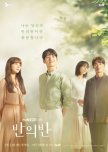
This review may contain spoilers
It's pretty and has a smiley Hae In but half of a half of this would've been enough
This would probably have deserved a 6.5 but it managed a half point more thanks to my inescapable, conscious weakness for Jung Hae In.The man smiles and I forget myself.
Hopeless.
Besides the hopelessness of my crush, though, I think it is relevant in this context to notice that it did not make me blind to a number of details that all together prevented my full enjoyment of this drama.
First and foremost, the sci-fi element: although this is definitely a romantic drama, I can't help but feel like they threw away a perfectly good sci-fi prompt by savagely mistreating it. The AI device is meant to be a pretext to entangle these characters' lives, and nothing more. Which is very upsetting because the whole idea of a device mimicking a person pattern of speech, and a dead person's speech at that, is so very intriguing and presents the perfect opportunity to push beyond boundaries and explore bereavement and healing and human relationships. Furthermore, they could have easily made it believable given the current state of AI development when, instead, throughout the drama, the technology felt absolutely unbelievable in multiple instances (e.g. I could have believed the Jisoo device becoming aware of itself, although it occurred too randomly and too suddenly for my tastes, but I could not suspend my incredulity when it asked to hear Jisoo's husband's voice, or, again, when it remembered memories that were not input by the owner of the memories themselves).
In my eyes the mismanagement of the sci-fi aspect (which was the reason I was drawn to watch in the first place… ok, maybe second place after Hae In) is an unforgivable sin, especially considering how much it propelled the plot forward in the beginning. A sin that took me out of the story and interrupted its flow and congruity.
The second element that disappointed is character development. I'm not saying it was completely messed up, yet it felt sloppy and, almost, unfinished. One recognizable theme in the story is basically about the capacity to overcome trauma through human connection, but the process that brings each character to their healing is confusing. Motivations behind certain actions were cryptic at times and I seldom understood the reasons for characters' choices or empathized with them. I also believe that the pacing didn't help. In particular with the confrontation that should have been the climax of the story: at that point the tension had completely dissipated and nothing about that scene felt pivotal for the characters.
Cinematography, acting and soundtrack sustain the whole drama and confer cohesion to the narration. The colors, the lights, the locations as well as the melodies work wonderfully toward evoking soothing, pensive, intimate atmospheres.
There isn't any performance that can be considered outstanding, yet the fact that the characters still come through despite imperfect writing attests the solid quality of all actors.
I liked the idea of building a tale of crossed destinies, how it conveys the theory of interconnection and the weight of human relationships, however it felt fumbled, notably with secondary characters (i.e. Min Jung), and some connections were forced (i.e. the one between In Wook and Soon Ho).
The attempt at creating a complex narration through recollection and discovery and a single character that unites all the others and dies early on is compelling enough. Still, I consider it a failed attempt since the character the story hinges on isn't interesting enough to prop everything else.
I believe the show's greatest merit lies in the development of the protagonists' relationship. They come together naturally by filling each other existential emptiness. The other's presence is the necessary prompt to leap beyond the blocks that hinder their growth. And it is heartwarming seeing these people learn how to stand on their own feet by meeting each other halfway (rather than just leaning on the other person).
It takes courage to look at all the pieces we're missing, those parts we lost along with the people that cherished them. We try to cling on the emptiness in fear of forgetting the love we gave and received, in fear of being too damaged to carry on by ourselves.
We need a connection to map out the unfamiliar borders that make up our self, the self that survived the loss.
We need a connection to want to feel complete again.
This is the hopeful message I want to take home from this show and, although I was let down by the clumsy misuse of the great potential of this story (hence the harsh score), I can ultimately say that it was worth watching.
But, most of all, how could anyone not forgive and forget looking at Hae In smiling, though?
Female Empowerment Score (5/5) portrayals of women helping each other always win my favor. Always.
Was this review helpful to you?
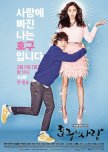
This review may contain spoilers
Choi Woo Shik plays the fool for the umpteenth time (but he is really adorable in this one)
This drama is penned by the same writer of Because This Is My First Life.Indeed, we get some recurring themes. For instance: the rape theme; couples as partners who help each other get through ordinary hardships; the upheaval of Korean social normativity regarding relationships and happiness (e.g. we get one love triangle but it is the most unexpected one).
Once again the writer touches on some heavy topics (i.e. homosexuality, abortion, rape, shame, suicide and motherhood as well as fatherhood) and yet constantly aims at keeping the tone light and avoiding depth and true controversy.
This effort is carried out through a series of misunderstanding plots in true Comedy-of-Errors fashion. Although the result is undoubtedly funny in the beginning and nicely offsets the disruption in the characters' relationships needed for their growth arc, the continuous mishaps seem to drag the story after a while. They get more ridiculous overtime and are clearly used as filler rather than effective plot.
I enjoyed the overall story nonetheless.
I think the characters were well written and their arc was coherent and interesting to follow.
Ho Goon is interpreted in the most endearing and believable way: he doesn't come off as absurdly foolish, cartoonish or nauseatingly sweet. Rather he is the most lovable soft-boy as well as one of the greenest flag in dramaland.
What I've come to love about the male characters created by this writer is the fact that they are full rounded people that don't follow the canonical gender-coded behavior we so often see in romantic dramas. They have the ability to be lovable by uprooting their classic social role and fully respecting the female characters' agency and choices.
They don't protect, instead they support.
There are a couple of judgmental speeches, by the male protagonist, regarding abortion and what a mother's love should look like, that I didn't particularly appreciate. But, overall, I liked how the writer handled emotion to convey her message and personal view.
I also welcomed the realism of the rapist being absolved after the first trial and the victim being ostracized (by police and the public). It was bitter but the protagonists weren't discouraged in their search for happiness and the ending was sweet and uplifting.
The kid is too cute, fantastic actor. Made me feel all the feels.
FES (5/5) The female characters are all strong and their strength is wittingly shrouded in unexpected fragilities. We have the popular, amazing athlete who is in love with a fool and thinks she is unworthy because of the terrible violence she suffered; the badass (so much cooler than her brother), intelligent (ace student) girl with a thousand suitors that is ashamed of her bare face; the queen of the house mom that has a soft spot for stray cats and wants an ordinary happiness for her son but is too compassionate to hurt someone else; the accomplished psychology professor who defers to her husband's foolishness.
We bring ourselves down for the most absurd reasons. If only we could look at ourselves through the eyes of those who love us…
Was this review helpful to you?
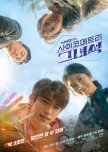
This review may contain spoilers
Cho Byeong-kyu: guru of limping characters
Adorable orphan himbo with uncomfortable superpower meets smart, confident girl on a quest to clear her father's name.This is basically the core character dynamic of this drama. We also get the unfailingly entertaining big brother/little brother/unconventional found family combo that always seals the deal for me.
He is Psychometric manages to go even beyond the excellent weaving of relationships among interesting characters and builds upon a comfortably intricate plot.
There are only two downsides in this otherwise outstanding drama.
First and foremost, it is notably lacking in the suspense department for a thriller. We come to expect every turning point of the plot (except for the main one that is, however, given out with 3 episodes of not-so-subtle hints before the final revelation) because it is foreshadowed clearly just before its occurrence.
The story itself remains engaging nonetheless, it is just not very thrilling.
My second criticism is about the choice of founding much of the plot resolution on a (M. Night)Shyamalan type of twist. It is a cool gimmick but decreases, inevitably, the whole drama rewatchability.
These are the main drawbacks in terms of screenplay, but I don't think they affect much the drama's overall enjoyable vibe. The cast, in fact, makes a very fine job in drawing the viewer's attention.
My favorite character is Kang Sung-mo, which is played by the impressive Kim Kwon. He is a new entry in my kdrama hotties' Olympus as I don't think I've encountered him in my previous viewings.
His character is definitely the most complex as he undergoes a progressive humanization throughout the story. Starting from an inscrutable, rational, super-human (as in "very-little-like the humans we know") upstanding hero (on the metaphorical pedestal of a rooftop apartment) that functions almost like a deus-ex-machina for the young protagonists, he descends all the way to the underworld (the subway abandoned station, the underground prison) becoming the irrational, sub-human executioner driven by the need for survival, protection and revenge.
Although a diagnosis of alexithymia makes everybody question his ability to feel emotions, we are often reminded that being unable to express emotions is indeed different from being unable to feel them.
Park Jin-young is fairly convincing as the warmhearted himbo. His Lee Ahn is cute and endearing and does a great job of lightening the tone even when the story grows darker. The character also serves as a counterpoint to Sung-mo, in many ways. For example, where a teenager Sung-Mo made a terrible choice (he regretted soon after) because he felt trapped in the absence of trusted adult guidance, teenager Ahn was able to turn his life around and overcome his anger (thanks to the guidance of the very same Sung-Mo).
Shin Ye-eun also does a decent job, although she isn't particularly brilliant. I think the main couple has the highest romantic tension in the high school episodes and it mellows out later on. The actors have chemistry, but it feels friendly in nature more than romantic. I think it is a writing choice resulting from the intention of focusing more on other plot points and themes. In this respect, the brief moment of angst between the main couple was a bit useless and felt perfunctory.
The second couple is much more entertaining, in my opinion.
When reaching the end of this drama someone might think the writer is implying that a bad seed is a bad seed and it is impossible to transcend genes and conditioning.
Both father and son seem to be condemned to the same fate of isolation from society. They are both behind bars, yet there is a fundamental difference in their confinement. Whilst the father is sentenced to never leaving those bars, not even the invisible ones tying him to his horrific childhood, Sung-mo is instead finally allowed to escape the prison of his past through atonement. I loved the fact that despite the terrible murders he committed, the writer didn't opt for an unredeemed suicide and instead told us that the hardest choice is asking for forgiveness and living to atone for the hurt caused.
It is a very Christian solution and, in fact, there are explicit Christian references all throughout the drama as it is also apparent with the theme of forgiveness that recurs in the relationship dynamics of the characters every so often.
The writer makes another important point by including a reflection on collective responsibility. The monsters in her story are the product of a faulty and corrupted society.
I believe there is also a theme of disgust: people picking their nose and leaving boogers under the desk, people eating things found on the floor, people touching corpses, people pulling nose hairs and flicking them in other people's faces and ongoing talks of festering wounds. Is it because human condition is inherently execrable? Who knows? I don't.
I really liked the visual representation of psychometry although it didn't make much sense with the shifting POVs (does Ahn see things from hi POV, does he see them from the object POV? It varies).
The title of the review refers to the fact that it is funny (only to me) to see Cho Byeong-kyu limping again after watching the Uncanny Counter (albeit chronologically speaking HIP comes first).
Female Empowerment Score 4/5 we had to sacrifice the female detective to convince men to take responsibility for their actions. On the other hand, I love the natural comradery, the girl friendships. I also love that the women in this drama are smart and don't wait around to be saved but, instead, become the hero they need.
Was this review helpful to you?

